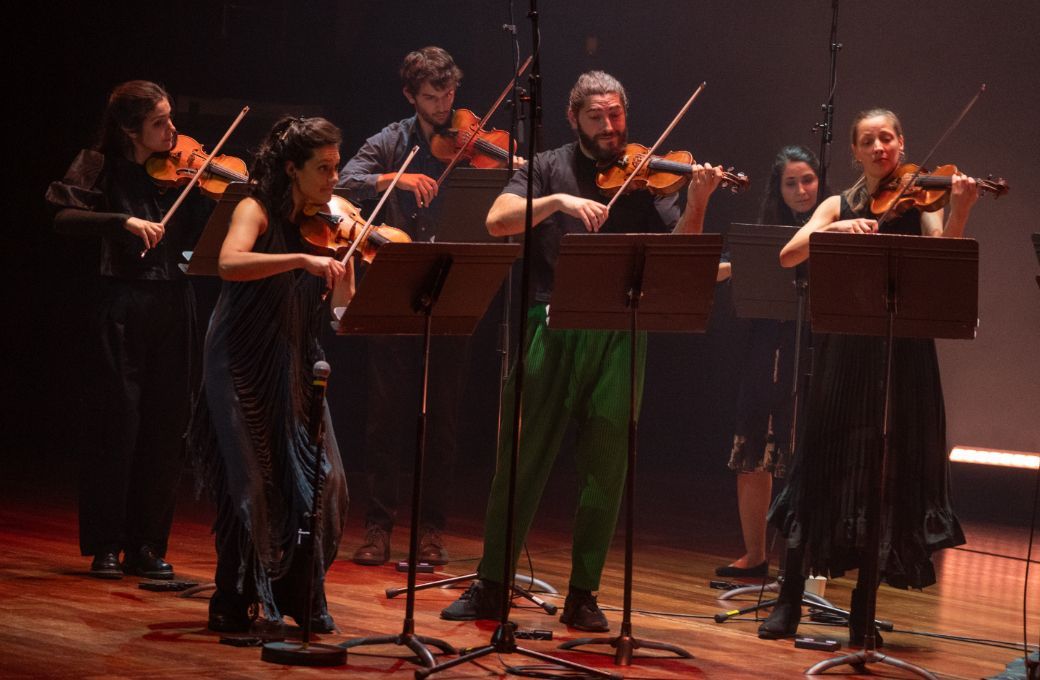For some time now, the classical music industry has been grappling with the question of how to modernise itself. That is, to make it competitive with other forms of entertainment (if such a term is ever fit for music) and to attract new, younger audiences. A prime example of a group addressing this thorny issue is Manchester Collective. With them, you always know what to expect: stellar performances, quirky programming, striking stage design and effective communication with the audience. Their new programme, “Fever Dreams”, which had its London premiere last Saturday, reaffirmed their commitment to this mission, even if the dishes they attempted to serve may have been a bit too diverse and flavourful for some.

Bathed in rose-coloured mist, the 17 players of Manchester Collective – each equipped with an individual iPad, a reminder that the days of printed music may soon be numbered – opened with the Concerto for string orchestra by Grażyna Bacewicz. It set an assertive, feverish tone for the evening. Written in Communist Poland in 1948, the work’s intense drama and brooding lyricism were brought to life through the players’ vigorous pizzicati, rhythmic drive and unified bowing. Throughout the performance, the players’ zest – particularly those standing, as they bobbed with excitement – was unmistakable. The music completely absorbed them.
The inspiration for Laurence Osborn’s newest concerto for keyboards (piano and MIDI keyboard) and string orchestra, Schiller’s Piano, co-commissioned by Zubin Kanga and Manchester Collective, has an intriguing origin. The title refers to a story about Buchenwald concentration camp inmates who were forced by the Nazis to create a replica of Friedrich Schiller’s historic piano. The real piano was hidden, while the replica – an empty shell – was displayed. The piece featured a panoply of fine musical ideas, from field recordings of birdsong and samples of the piano’s physical components – wood, brass, felt, and wire – to virtuosic keyboard passages and gentle singing. Yet, something felt off, lacking the cohesive force needed to gel its individual elements together. Despite this, the combined efforts of conductor Aaron Holloway-Nahum, pianist Kanga and the Collective were impressive. Particularly exciting was Kanga’s virtuosic handling of both the piano and keyboard, especially in the more rhythmically challenging sections, as well as his intimate performance of Das Buchenwaldlied, a song composed in 1938 for the concentration camp.
The second half of the concert interwove music by Tchaikovsky, Caroline Shaw and Wojciech Kilar into one silky, non-stop tapestry. On the one hand, this experiment demonstrated how music from different periods has much more in common than one might think. On the other hand, it may have made things slightly confusing for those without a programme note or background knowledge. Two sections of Tchaikovsky’s Serenade for Strings resonated with the same bold, confident quality found in the first work of the evening. The ensemble was incredibly tight and their dynamic control, especially during the more powerful sections – remarkable for a 17-member group – was commendable. At times, they sounded like one massive instrument, blending individual timbres into a unified whole. Two sections of Shaw’s The Evergreen radiated with a celestial aura, draped in glossy harmonics with a post-minimalist flavour. Finally, Kilar’s Orawa showcased impeccable rhythmic precision. As is often the case, Manchester Collective’s blending of the old and the new has resulted in a programme that feels well-suited to a 21st-century concert hall.


